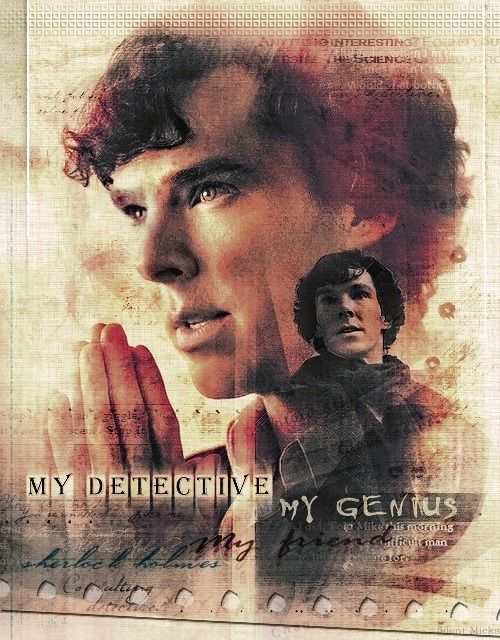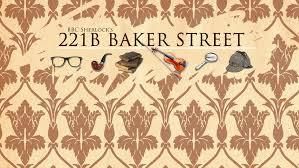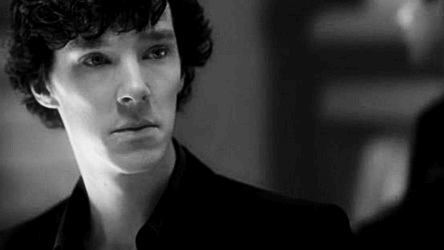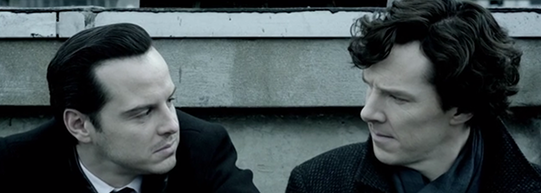
BBC Sherlock Fan Forum - Serving Sherlockians since February 2012.
- Lilythiell
- High Functioning Sociopath
 Offline
Offline 
- From: France
- Registered: May 11, 2014
- Posts: 2,371
Re: The Abominable Bride (for those who have seen it)
Aw, isn't that cute?
Of course the vaaaaast majority of us hadn't missed much.
Loved number 32. *giggles*
I admit I wouldn't have caught the bell-adorned deer if I hadn't had a tour of Victorian 221B.
Incidentally, there's something else that was said in the special feature at the beginning : look closely at the glass of the door -between the Door and the stairs-, and pay attention to the drawings on it.
I didn't know for certain about number 18 -the costumes being replicas of actual Victorian designs. It looked so authentic however that it doesn't come as a surprise to me.
I was not aware of the second part of number 27 -the actor who plays Wilder's appearance in Doctor Who and in a Sherlock Holmes TV adventure- but the nod to Billy Wilder was so loud it made me deaf xD
I wouldn't have spotted number 30 -the Carmichael house, Watson's dining room- if it hadn't been for the keen eyes of the Fandom.
As for number 34, well...we're still working on it, aren't we? ![]()
-------------------------------------------------------------------------
I'd be lost without my blogger.
"It’s not a ‘gang’ show, it’s the Sherlock and John show. It’s about developing their characters and their relationship, and the characters drawn into their orbit.” Steven Moffat

- Vhanja
- One More Miracle
 Offline
Offline 
- From: Sandnes, Norway
- Registered: December 11, 2014
- Posts: 6,607
Re: The Abominable Bride (for those who have seen it)
Wow, including following Setlock and reading/discussing here, I only got about 14 of those.
__________________________________________________________________________________________________________________________________________
"We'll live on starlight and crime scenes" - wordstrings

Team Hudders!
- ukaunz
- High Functioning Sociopath
 Offline
Offline 
- From: Australia
- Registered: February 13, 2015
- Posts: 2,584
Re: The Abominable Bride (for those who have seen it)
Finally got through all the posts in this thread! It's a bit late to worry about recording my first impressions, oh well. Most of my thoughts and questions have been brought up already. I've still only seen the episode once, but having read the basic transcript that was linked here, I feel I've caught up with most things I missed and have the sequence of scenes sorted out more firmly in my mind. It will be so good to watch the episode again when I get the chance. The loud laughter at certain moments from the audience in the cinema meant that I missed some dialogue, so I'm glad to at least have the transcript (although Ariane's will be so much better).
I do want to say that I caught on fast to the woman in black being Mary; as soon as Sherlock said "You have recently married a man of a seemingly kindly disposition, who has now abandoned you for an unsavoury companion of dubious morals" I had guessed it was Mary, and then the bit about the perfume confirmed it. I was also not fooled by Hooper's disguise for one moment ![]() I picked up on the odd phrases (virus in the data) and the flash to modern John but didn't know what to make of them. Then the weird shaking started in the scene with Moriarty and I knew something odd was happening. But the reveal that it was happening in Sherlock's mp when we cut to everyone on the plane still made me gasp, I had been so absorbed in the Victorian era story.
I picked up on the odd phrases (virus in the data) and the flash to modern John but didn't know what to make of them. Then the weird shaking started in the scene with Moriarty and I knew something odd was happening. But the reveal that it was happening in Sherlock's mp when we cut to everyone on the plane still made me gasp, I had been so absorbed in the Victorian era story.
I also had a little gasp at the mention of Pepper's Ghost. I had only just read that secret Santa story, and it seemed such an impossible coincidence! The only other explanation I could come up with was that the author had seen/heard something in setlock, perhaps even deduced it from clues, and decided to include it in their story ![]()
The note for Mary from "M" - the names Mycroft and Moriarty did immediately spring to my mind, but did no one else wonder if it could have been from Molly? Secret women's business? Obviously it did turn out to be from Mycroft, but I was momentarily distracted by my speculations...
The impertinent maid was a Doyle reference wasn't it? I'll have to check the canon...
Sherlock coming out of his trance: I see I wasn't the only one to think of Dorothy returning from her adventure in Oz, pointing to everyone saying "you were there, and you."
I will have to come back when I have returned home to Australia (am still in NZ) and can spend more time reading through all the discussions. For now I am called away to family duties!
----------------------------------------------------------------------------------------------------------------------------------------------------


- ukaunz
- High Functioning Sociopath
 Offline
Offline 
- From: Australia
- Registered: February 13, 2015
- Posts: 2,584
Re: The Abominable Bride (for those who have seen it)
Oh, and one more thing... The song that the bride sings, "The Maid of the Mill", somehow makes me think of the maid of Charles Augustus Milverton, who was lied to by Holmes and became engaged to him... And in TAB Sherlock mentions the women he has lied to, and Janine is there... Interesting?
----------------------------------------------------------------------------------------------------------------------------------------------------


- Liberty
- Moderator
 Offline
Offline 
- Registered: June 29, 2014
- Posts: 5,972
Re: The Abominable Bride (for those who have seen it)
Well, the maid is long dead, so I liked to think of it as Sherlock remembering the women from the past, and somebody else mentioned Moriarty, but I do like your idea too. I don't think "maid" in the song means a maid in the sense of employment, but a maiden, a young woman.
No 24: isn't the point that Watson writes it, whether or not Sherlock actually says it? And people then assume he does? Nice list - there were quite a few I missed! (Haven't seen The Case of the Silk Stocking, and now it looks like they've spoiled the ending!).
Last edited by Liberty (January 5, 2016 7:56 pm)
- Harriet
- Most Human Human Being
 Offline
Offline 
- From: 110A Piccadilly
- Registered: August 24, 2012
- Posts: 9,887
Re: The Abominable Bride (for those who have seen it)
Vhanja wrote:
I love commentaries too. Mostly because I love trivia about movies and shows that I love.
That's what they are good for, trivia for those who enjoy! And there's nothing bad about it ![]()
Eventually everyone will support Johnlock. Independent OSAJ Affiliate
... but there may be some new players now. It’s okay. The East Wind takes us all in the end.
- besleybean
- Threatened Knighthood
 Offline
Offline 
- From: Carnoustie, Angus, Scotland.
- Registered: October 4, 2012
- Posts: 21,362
Re: The Abominable Bride (for those who have seen it)
For me they are the equivalent of an artist discussing his painting or an author his book.
---------------------------------------------------------------------------------------------------------------------------------------------------------------
- Ivy
- High Functioning Sociopath
 Offline
Offline 
- From: Berlin, Germany
- Registered: July 31, 2012
- Posts: 2,330
Re: The Abominable Bride (for those who have seen it)
some "behind the scenes" gifs
- besleybean
- Threatened Knighthood
 Offline
Offline 
- From: Carnoustie, Angus, Scotland.
- Registered: October 4, 2012
- Posts: 21,362
Re: The Abominable Bride (for those who have seen it)
Oh that's the one I mentioned in my notes...Benedict and Martin reading.
---------------------------------------------------------------------------------------------------------------------------------------------------------------
- Liberty
- Moderator
 Offline
Offline 
- Registered: June 29, 2014
- Posts: 5,972
Re: The Abominable Bride (for those who have seen it)
I loved that bit - and it's funny how Martin's reading the newspaper (suitable for the Victorian version) while Sherlock has the phone.
Last edited by Liberty (January 5, 2016 10:26 pm)
- Bruce Cook
- Lestrade's Aide
 Offline
Offline 
- From: Charlotte
- Registered: January 7, 2014
- Posts: 107
Re: The Abominable Bride (for those who have seen it)
________________________________
After watching The Abominable Bride three times (the minimum number of times a member of this board can watch it and still call himself a true fan) , I think I’ve got this amazing story figured out. ![]()
Before this gets all deep and intellectual, I loved the way the first scene on Baker Street in 1880 did several things to emulate the 1984 Grenada series, The Adventures of Sherlock Holmes, with Jeremy Brett.
The music is a variation on the theme from that series, the camera pans down from a slight elevation to the street level, and Martin Freeman starts narrating the tale in the same manner as David Burke’s version of Watson did in the Grenada series from 32 years earlier.
It was a delightful “in joke” for fans of the classic series.
Now, on to deeper matters.
One important aspect of the story in the Christmas special is — in my highly biased opinion — the idea that Sherlock is having doubts about whether or not Moriarty is actually dead. The hints start fairly early.
In The Abominable Bride we see a crazed woman stick a pistol barrel into her mouth and appear to blow her brains out, even though she shows up hours later and murders her husband with a shotgun before she walks off slowly into the fog.

Sherlock is mighty vexed by the idea that somebody could turn their brain into Yorkshire pudding and still walk around in a wedding dress. With him, this is very personnel . . . and we know why.
Later in the morgue, Sherlock is examining the body of the woman, and he starts mumbling things like " . . . blew his brains out . . . how did he survive?"

And when he's talking to Microft about the “Miss me?” note Sherlock found on the murdered man, Mycroft says, "DO you miss him?"
Sherlock: "Moriarty is dead."
Mycroft: "And yet . . ."
Sherlock: "His body was never recovered."

If that isn’t plain enough for us, Moriarty himself pays Sherlock a visit and says creepy things like, "The bride put a gun in her mouth and shot the back of her head off, and then she came back. Impossible . . . and yet she did it . . . and you need to know how. It’s tearing your world apart!”

And at the end, when John asks Sherlock if Moriarty is alive, he says, “I didn’t say he was alive, I said he was back.”
Clearly there are some tricky semantics at work here. But when Mary says, “So, then he’s dead?” we get what seems like a definite answer.
“Of course he’s dead. He blew his own brains out. No one survives that.”
This is undeniably true, of course. But I suspect what he really meant was, “Of course he’s dead . . . if he blew his brains out. No one survives that.”
In other words, two fact have been established in the story.
(1) If a person blows their brains out, they cannot be alive.
(2) If a person is alive . . . they did not blow their brains out.
Now, if that sounds like my own desperate effort to contradict Sherlock’s next statement —
“Moriarty is dead. No question.”
— I’d like to point out that Sherlock contradicts it himself with his final remark.
“More importantly . . . I know exactly what he’s going to do next.”
So, Moriarty is definitely dead, but he’s also definitely back, and he’s doing things which Sherlock can predict. I'm eagerly waiting to see how Jim manages that trick. ![]()

Obviously a lot of reading between the lines is necessary, and a good place to start might be to ask ourselves this intriguing question.
Why would Sherlock need a drug-assisted mind palace to prove that if someone blows their brains out they can’t still be alive?
Let’s be logically about this: he obviously wasn’t trying to find out if someone could live after such a traumatic injury. He was actually exploring all the ways that such an injury could be faked, and all the reasons someone might have for creating a hoax of that magnitude.
To do this, he used his mind palace to recreate an old and unsolved case that actually used a fake suicide to achieve an ambitious goal. A woman seemed to rise from the dead and commit multiple murders. What Sherlock discovered, of course, was that she faked her suicide and committed one murder — then she died in an “assisted suicide”, and other women used the legend of the ghostly bride to commit additional murders and confound the police.
So, what did Sherlock’s drug-assisted mind palace teach him? (And us.) Quite a lot, actually. Such as:
_______________________
If someone blows their brains out, they’re definitely dead.
If someone is not dead, they definitely did not blow their brains out.
Dead people don’t rise from the grave to commit murder.
Living people can use deception to get away with murder.
Smart people don’t kill themselves when a fake suicide works better to accomplish their goal.
_______________________
So, Sherlock has seen ample evidence in his mind palace that a fake suicide can be used to great advantage. But in the final analysis, I don’t think this episode was meant to answer the question, “Is Moriarty alive?”, I think it was meant to make us keep asking it.
I, for one, have faith that Steven Moffat, Mark Gatiss, Sherlock Holmes, and Jim Moriarty will all do the smartest things possible in the upcoming season. And having Jim do nothing smarter than just kill himself isn’t the smartest thing possible.

Last edited by Bruce Cook (January 6, 2016 2:53 am)
A good debate is like a fencing match — you don't have to win to get a good workout.
- besleybean
- Threatened Knighthood
 Offline
Offline 
- From: Carnoustie, Angus, Scotland.
- Registered: October 4, 2012
- Posts: 21,362
Re: The Abominable Bride (for those who have seen it)
@Bruce...though we may have to accept that. I mean it won't be just kill himself. He will at least have left something in place.
@Liberty in my previous notes, I gave my own explanation of Benedict being absorbed in his phone. But because I am unsure of forum rules on discussing real people, I don't want to draw attention to it. Suffice to say, think what date they were filming last year!
---------------------------------------------------------------------------------------------------------------------------------------------------------------
- Liberty
- Moderator
 Offline
Offline 
- Registered: June 29, 2014
- Posts: 5,972
Re: The Abominable Bride (for those who have seen it)
I know, Besleybean, I'd actually mentioned your explanation in my post but later amended in case it broke the forum rules!
- This Is The Phantom Lady
- Threatened Knighthood
 Offline
Offline 
- From: Home of Hamlet (Denmark)
- Registered: February 6, 2014
- Posts: 10,183
Re: The Abominable Bride (for those who have seen it)
Ivy wrote:
some "behind the scenes" gifs
Bless Ben's laugh when they spray water on him! Thank you! I needed to start the day off with a giggle!
~~~~~~~~~~~~~~
"Don't talk out loud, you lower the IQ of the whole street!"

"Oh Watson. Nothing made me... I made me"
"Luuuuurve Ginger Nuts"
Tumblr[/url] I [url=]AO3
#IbelieveInSeries5
- Lilythiell
- High Functioning Sociopath
 Offline
Offline 
- From: France
- Registered: May 11, 2014
- Posts: 2,371
Re: The Abominable Bride (for those who have seen it)
I know it is a stupid question...but do you think that it was on purpose that Mofftiss titled their episode "Sherlock: The Abominable Bride" so its acronym would be STAB -accurate definition of what happened after we've seen it : stab through the hard.
-------------------------------------------------------------------------
I'd be lost without my blogger.
"It’s not a ‘gang’ show, it’s the Sherlock and John show. It’s about developing their characters and their relationship, and the characters drawn into their orbit.” Steven Moffat

- asylum69
- Homeless Network
 Offline
Offline - Registered: January 2, 2014
- Posts: 19
Re: The Abominable Bride (for those who have seen it)
DavidM1337 wrote:
"Moriarty is dead. And I know what he does next."
Yes, and I *need* to know too! Any theories anyone?
- Ivy
- High Functioning Sociopath
 Offline
Offline 
- From: Berlin, Germany
- Registered: July 31, 2012
- Posts: 2,330
Re: The Abominable Bride (for those who have seen it)
Bruce Cook wrote:
________________________________
Oh, that a great pic. ![]()
- SolarSystem
- Threatened Knighthood
 Offline
Offline - From: Germany
- Registered: July 30, 2013
- Posts: 10,650
Re: The Abominable Bride (for those who have seen it)
Bruce Cook wrote:
Let’s be logically about this: he obviously wasn’t trying to find out if someone could live after such a traumatic injury. He was actually exploring all the ways that such an injury could be faked, and all the reasons someone might have for creating a hoax of that magnitude.
That's actually a pretty good point. Because yes, does Sherlock really need to go back to an old case in order to find an answer to the question if someone can survive something like this? Like you said, it's pretty obvious that you can't - or if you do, you'll most likely not be the same person as before. You'll most likely suffer severe brain damage, among other things.
Still, I have to say that I don't really want to find out in S4 that Sherlock and Jim both faked their deaths. Because what would this mean? To me it would mean that everything we see in the show is totally arbitrary and that Mofftiss don't stick to anything and just change things around whenever they feel like it (and probably give a smartass comment like "Oh, don't tell us you didn't see this coming...?! It was so obvious and we lie all the time anyway!"). And I know it's true, they lie all the time... but it feels a bit as if sometimes that's a comfortable excuse for pretty much anything they do.
___________________________________________________
"Am I the current King of England?
"I see no shame in having an unhealthy obsession with something." - David Tennant
"We did observe." - David Tennant in "Richard II"
- This Is The Phantom Lady
- Threatened Knighthood
 Offline
Offline 
- From: Home of Hamlet (Denmark)
- Registered: February 6, 2014
- Posts: 10,183
Re: The Abominable Bride (for those who have seen it)
Is the thing about Moriartys body mot having been found the question that no one is supposed to have been asking?
~~~~~~~~~~~~~~
"Don't talk out loud, you lower the IQ of the whole street!"

"Oh Watson. Nothing made me... I made me"
"Luuuuurve Ginger Nuts"
Tumblr[/url] I [url=]AO3
#IbelieveInSeries5
- besleybean
- Threatened Knighthood
 Offline
Offline 
- From: Carnoustie, Angus, Scotland.
- Registered: October 4, 2012
- Posts: 21,362
Re: The Abominable Bride (for those who have seen it)
I always assumed it was in Sherlock's grave.
---------------------------------------------------------------------------------------------------------------------------------------------------------------


